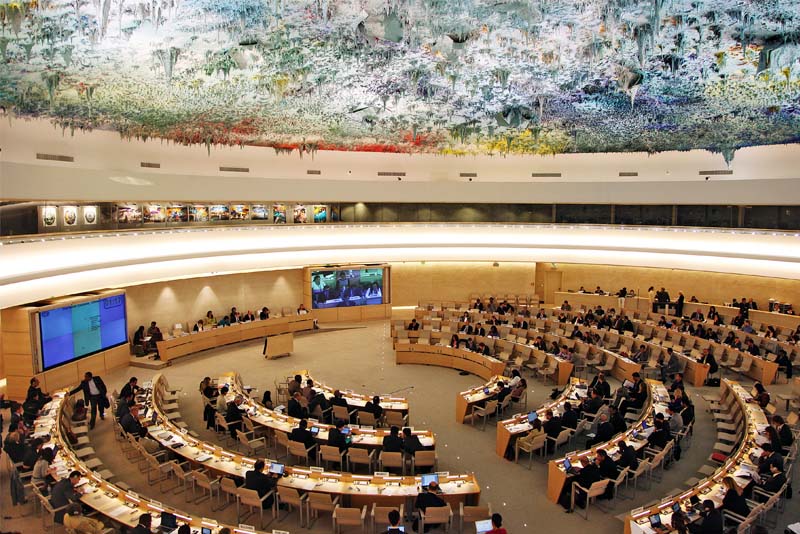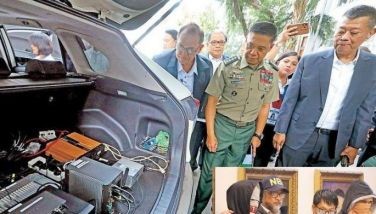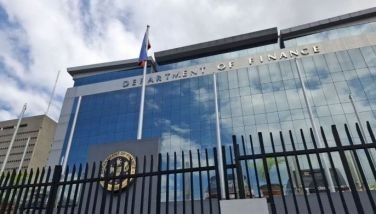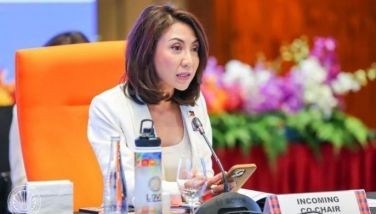Philippines rejects nations' positions on drug war deaths

Seat of the United Nations Human Rights Council in Geneva. UN Brief photo
'Deaths in drug war are not EJKs'
MANILA, Philippines (Update 3, Sept. 23 at 11:14 a.m.) — Accepting only 103 out of 257 recommendations, the Philippines rejected 44 of the United Nations member-states' positions on extrajudicial killings despite thousands of questionable deaths over the past year.
At the 36th regular session of the UN Human Rights Council in Geneva on Friday (Manila time), Ambassador Evan Garcia relayed the Duterte-led government's denial of the existence of extrajudicial killings in connection with the brutal campaign against illegal drugs.
The recommendations were made by member-states in May this year at the Universal Periodic Review in Geneva where then Sen. Alan Peter Cayetano, now Foreign Affairs secretary, faced the international body in defense of Duterte's anti-narcotics campaign.
READ: Where nations stand on EJKs, death penalty in Philippines
Garcia, at the session on Friday, explained that the non-acceptance of the recommendations—99 of which were marked in the Philippines' report as merely "noted" while 55 were outrightly "rejected"—was anchored on "national circumstances."
"The State (Philippines) had sufficiently explained that deaths, which occurred in the course of the implementation of the [anti-illegal drug campaign], are not EJK," the report read.
"These are deaths arising from legitimate law enforcement operations or deaths that require further investigation following the established rules of engagement by the country's law enforcers," it continued.
The Duterte government's reiteration of its position affirmed its previous statements putting forward what was seen as a limited definition of extrajudicial killings and falling short of recognizing the universal characteristic of human rights before the same international forum.
The Philippines' response was a letdown to some member-states, including the country's longstanding ally, the United States, and partner, the United Kingdom, whose representatives expressed disapproval.
READ: Fast facts on the UN review of Philippine human rights
The Philippines, according to the UK representative, has made statements questioning the universality of human rights. It also called for "thorough and independent investigations into all violent deaths," including those involving state actors.
The US, meanwhile, is "greatly concerned about ongoing reports on extrajudicial killings" and called upon the Southeast Asian country to conduct transparent investigations.
"We remain greatly concerned about ongoing reports of extrajudicial killings," the representative of the US mission said, after welcoming the Philippines' acceptance of its recommendation to follow the rule of law in police operations.
Civil society organizations, such as international watchdog Human Rights Watch, similarly expressed dismay over the Philippines' rejection of "all UPR recommendations that would make a practical difference in ending extrajudicial killings perpetrated in the name of its murderous 'war on drugs."
Human rights advocate Ellecer Carlos of Forum-Asia faced the UN body and reported that killings have not ceased since the Universal Periodic Review of the Philippines in May.
"Killings in the ‘war on drugs’ have increased, with over 60 people killed in police operations in the span of two days in August. Disturbingly, the Philippine president publicly encouraged police to continue operations in such magnitude," Carlos said.
More rejections, denials
Despite being a signatory to Universal Declaration of Human Rights and a member of the human rights council, the Philippines did not take heed calls by France, Ghana, Hungary and Latvia and several others to lift its conditions for the visit of Agnes Callamard, the current special rapporteur on extrajudicial executions.
President Rodrigo Duterte requires that Callamard's long delayed inquiry in the Philippines should involve a public debate between them. He also wants to reserve the right to ask questions while Callamard should answer under oath.
Callamard has been critical of the mounting number of deaths in the anti-drug campaign of Duterte, who has publicly chided the rapporteur a few times.
Human Rights Watch was also concerned that the Philippine government appears to have turned a blind eye to compelling evidence of police culpability in the killings.
Instead, HRW said, Duterte and his officials have vilified those demanding for accountability, including detained Sen. Leila de Lima, officials of the Commission on Human Rights and Callamard.
The Philippines also failed to commit to 13 recommendations on protecting journalists and human rights defenders that may be seen as a reference to Duterte's threats against the two groups.
The UK did not take the rejection lightly. "We are also concerned by continuing threats made against human rights defenders. We call on the government of the Philippines to promote a safe, enabling environment for the work of human rights defenders, including through the adoption of a charter for the protection and recognition of human rights defenders," the UK Mission to Geneva said.
Amnesty International and FIDH movement slammed the Duterte government's move to use the UPR as a "platform to justify its lethal anti-drug policies."
Responding to the reviewers, Ambassador Garcia of the Philippines said: "There is no culture of impunity in the Philippines... All (of the killings) are being investigated, and cases have been filed."
Garcia's statement, however, runs counter to findings of a study that the country has the worst record of impunity.
Sanctions against Philippines urged
Ahead of UN member-states' push for independent investigation into the government's human rights violations was a call by a Geneva-based group to sanction the Philippines, where observers noted presidential orders to shoot human rights defenders and intimidate the Commission on Human Rights.
Earlier this month, the International Service for Human Rights said there ought to be an "unequivocal international response" to the Philippines in the absence of credible domestic investigation of killings.
The organization also said:
The UN Human Rights Council should take principled action based on objective criteria to sanction members cited by the High Commissioner who systematically repress civil society, intimidate and attack human rights defenders, and fail to cooperate with the Council and its mechanisms. At the current session, this includes Burundi, China, Egypt, the Philippines and Venezuela.
Duterte, however, is known to be nonchalant about human rights concerns. "I don't care about human rights, you better believe me," he said in July. He made similar remarks a few other times.
- Latest
- Trending
































